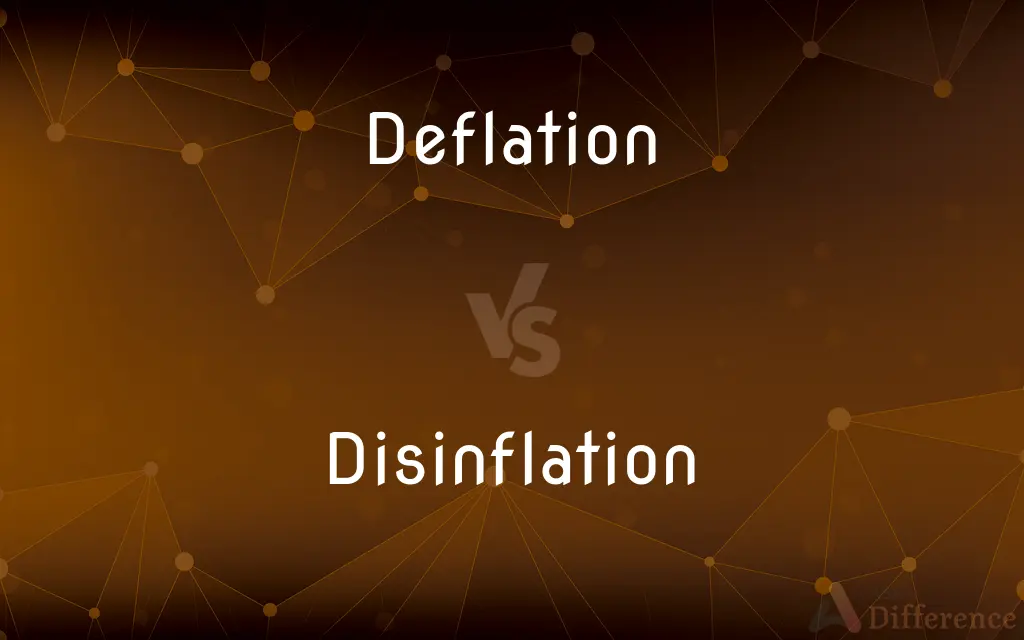Deflation vs. Disinflation — What's the Difference?
By Tayyaba Rehman — Updated on September 20, 2023
Deflation is a decrease in the general price level, while disinflation is a reduction in the rate of inflation.

Difference Between Deflation and Disinflation
Table of Contents
ADVERTISEMENT
Key Differences
Deflation refers to the actual drop in the general price level of goods and services, meaning prices, on average, are falling. Disinflation, on the other hand, is the slowing down of the rate at which prices are rising, but prices still increase.
An economy experiencing deflation sees its currency gaining purchasing power over time. Conversely, during disinflation, the currency's purchasing power is still diminishing, but at a decelerating rate.
Deflation often stems from reduced demand for goods and services or increased supply, leading to a drop in prices. In contrast, disinflation might be the result of governmental policies, like increased interest rates, aimed at controlling high inflation.
Extended periods of deflation can be harmful to an economy, leading to reduced spending and investment. Disinflation can be seen as a positive sign if inflation rates were previously deemed too high for economic stability.
Central banks, like the Federal Reserve, might combat deflation by implementing expansionary monetary policies. To encourage disinflation, they might adopt contractionary policies when inflation is perceived as too high.
ADVERTISEMENT
Comparison Chart
Price Movement
Prices are decreasing.
Prices are increasing, but at a decreasing rate.
Effect on Purchasing Power
Currency's purchasing power increases.
Currency's purchasing power reduces more slowly.
Cause
Reduced demand or increased supply.
Policies to control high inflation or natural factors.
Economic Impact
Can lead to reduced spending and investment.
Often viewed as stabilization after high inflation.
Monetary Policy Response
Expansionary policies to boost spending.
Contractionary policies to control high inflation.
Compare with Definitions
Deflation
Price decline: A general decrease in the prices of goods and services.
Deflation caused consumers to delay purchases in hopes of even lower prices.
Disinflation
Prices rising slowly: Prices still increase but at a decelerated pace.
Even with disinflation, the cost of goods was still inching upwards.
Deflation
Harmful economic state: A prolonged condition that can lead to recession.
Economists warned that prolonged deflation could harm economic growth.
Disinflation
Often policy-induced: Result of measures to control high inflation.
The central bank's actions led to disinflation in the economy.
Deflation
Increased currency value: When a currency buys more goods than before.
Deflation led to the dollar's increased purchasing power.
Disinflation
Transition phase: A move from high inflation to stable prices.
Analysts saw disinflation as a sign the economy was stabilizing.
Deflation
Decreased nominal revenue: Businesses earning less due to lower prices.
Companies struggled with deflation cutting into their profit margins.
Disinflation
Reduced inflation rate: A decrease in the rate of price increase.
Disinflation was evident as the inflation rate dropped from 5% to 3%.
Deflation
In economics, deflation is a decrease in the general price level of goods and services. Deflation occurs when the inflation rate falls below 0% (a negative inflation rate).
Disinflation
Disinflation is a decrease in the rate of inflation – a slowdown in the rate of increase of the general price level of goods and services in a nation's gross domestic product over time. It is the opposite of reflation.
Deflation
The act of deflating or the condition of being deflated.
Disinflation
A marked deceleration in the rate of inflation.
Deflation
A persistent decrease in the level of consumer prices or a persistent increase in the purchasing power of money.
Disinflation
(economics) A decrease in the inflation rate.
Deflation
The lifting and removal of small, loose particles, especially silt and clay particles, by eddies of wind.
Disinflation
(economics) Deflation
Deflation
An act or instance of deflating.
The loss caused utter deflation and disappointment among the fans.
Disinflation
A reduction in the rate of price increases; a lessening of inflationary pressure.
Deflation
(economics) A decrease in the general price level, that is, in the nominal cost of goods and services as well as wages.
Disinflation
A reduction of the value of a currency in international exchange markets caused by a government; - usually done as a means to improve the country's international balance of payments.
Deflation
An economic contraction.
Disinflation
A general and progressive increase in prices;
In inflation everything gets more valuable except money
Deflation
(geology) The removal of soil and other loose material from the ground (or another surface) by wind, leaving it exposed to erosion.
Disinflation
Controlled price momentum: Slowing down of runaway price increases.
Consumers appreciated the disinflationary trend, giving them relief from rapid price hikes.
Deflation
The act or process of deflating.
Deflation
A fall in the average prices of goods and services; - usually associated with contraction of economic activity. Opposite of inflation. Compare disinflation.
Deflation
The reduction of available credit or a contraction of economic activity resulting from or associated with a decline of prices.
Deflation
The act of letting the air out of something.
Deflation
The erosion of land structures such as sand or soil due to the action of wind.
Deflation
(geology) the erosion of soil as a consequence of sand and dust and loose rocks being removed by the wind;
A constant deflation of the desert landscape
Deflation
A general and progressive increase in prices;
In inflation everything gets more valuable except money
Deflation
The act of letting the air out of something
Deflation
Negative inflation: When the inflation rate goes below zero percent.
The country faced deflation of -2% last year.
Common Curiosities
Is disinflation always good for an economy?
Often yes, especially if previous inflation rates were high, but excessive disinflation might signal a weakening economy.
How can a country address deflation?
Central banks might implement expansionary monetary policies, like lowering interest rates, to combat deflation.
Are deflation and disinflation opposite concepts?
Not exactly. While deflation means prices are dropping, disinflation simply means the rate of price increase is slowing down.
How do consumers generally react to deflation?
They might delay purchases, anticipating even lower prices in the future.
Can disinflation lead to deflation?
Yes, if the rate of inflation continues to decrease, it can eventually become negative, leading to deflation.
What's the difference between disinflation and negative inflation?
Disinflation is the slowing rate of inflation, while negative inflation is another term for deflation, indicating falling prices.
Can deflation lead to a recession?
Yes, prolonged deflation can discourage spending and investment, potentially leading to a recession.
Can disinflation occur naturally?
Yes, it can be a result of reduced demand, increased supply, or other non-policy related factors.
Which is more common, deflation or disinflation?
Disinflation is more common as many modern economies have positive inflation rates that may vary in intensity.
What's the opposite of deflation?
Inflation, which is the general increase in prices over time.
Share Your Discovery

Previous Comparison
Logo vs. Crest
Next Comparison
Slip vs. BriefsAuthor Spotlight
Written by
Tayyaba RehmanTayyaba Rehman is a distinguished writer, currently serving as a primary contributor to askdifference.com. As a researcher in semantics and etymology, Tayyaba's passion for the complexity of languages and their distinctions has found a perfect home on the platform. Tayyaba delves into the intricacies of language, distinguishing between commonly confused words and phrases, thereby providing clarity for readers worldwide.














































